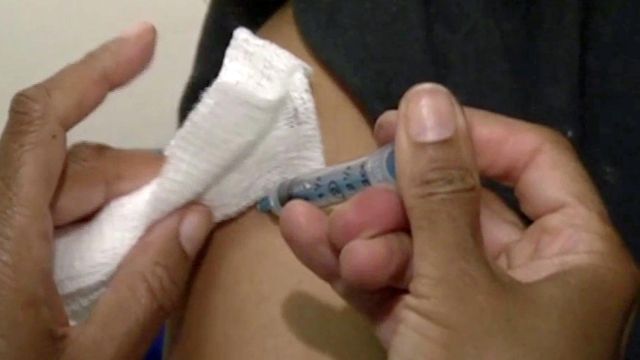Government fund compensates people hurt by vaccinations
Each year, doctors administer more than 250 million vaccines in the U.S. to protect against life-threatening diseases, and while most shots are given without any complications, thousands of people are injured by vaccines.
Posted — UpdatedDoug Dinunzio is one of those people. In 2014, coming off pneumonia, he nearly died after getting a flu shot.
"It was hell. I coded multiple times," he said. "There was multiple times where I begged to be killed."
The morning after getting the vaccine, the nerves in his feet were on fire. The pain moved up his body, and after a nap, the terror truly sank in.
"When I woke up, I went to get off the couch, and my legs didn't move," he said.
"As it progresses, it starts disabling nerves little by little until it gets your respiratory (system), and it shuts down your ability to breathe," Dinunzio said.
Greensboro attorney Nancy Meyers, who specializes in vaccine compensation cases, including Dinunzio's, said it's "very, very rare" for someone to be injured by a vaccine.
"There are unlucky people who develop very serious adverse reactions or allergic reactions to vaccines," Meyers said. "The most recent statistics show that, for every million doses of vaccines, only one person is compensated through the Vaccine Injury Compensation Program."
In the eight years prior to Dinunzio's flu shot, 2.5 billion vaccines were administered in the U.S., and only 17,184 people filed claims with the compensation program, citing serious rashes, sickness, paralysis or death.
The diphtheria-tetanus-whooping cough combination, with 3,982 claims, accounted for the largest percentage, followed by the flu vaccine with 2,767 claims and the measles-mumps-rubella vaccine with 977 claims. The vaccine court ruled years ago that no medical link exists between vaccines and autism, so those cases are not part of the program.
About 28 percent of the people who file claims win their cases, which Meyers said could result in compensation from $10,000 to several million dollars.
Dinunzio was awarded almost $500,000 for pain and suffering, medical reimbursements and future medical needs, but his case took a year and a half to settle.
He was lucky. A recent government audit found more than half of the vaccine compensation cases take more than five years to resolve.
"The way these cases draw out for so long, it's really cruel to those patients and those patients' families," Dinunzio said.
"It is a wonderful program, but unfortunately, it is a little slow," Meyers said.
Part of the problem, only nine judges have been assigned to the Vaccine Injury Compensation Program since its inception. In 1988, they handled 24 cases; last year, they had to deal with 862 claims.
"There's billions of dollars in the fund that I personally think should be given to more patients who desperately need it," Dinunzio said.
In addition to compensation, Dinunzio said he wants the fund to pay for research to find out why vaccines make some people sick.
"I think the concept of vaccines makes a whole lot of sense. Heck, we've eradicated diseases in this country thanks to vaccines. Thank goodness for that," he said. "But clearly there's still something broken."
Despite three months in the hospital and five more in rehab, Dinunzio is not anti-vaccine. He just wants people to know the possible consequences.
"If you ever hear of anybody getting a vaccine, you have to be 100 percent healthy to minimize – not eliminate, but minimize – the chance of side-effects from a vaccine," he said.
"I don't think about death anymore. I faced it, and I'm not letting GBS define me," he said. "I beat it, and now I'm back helping others do what I can do."
• Credits
Copyright 2024 by Capitol Broadcasting Company. All rights reserved. This material may not be published, broadcast, rewritten or redistributed.





